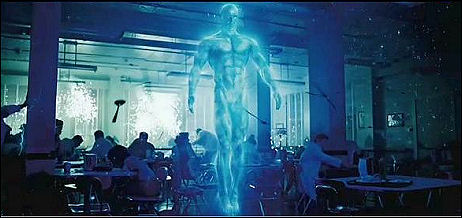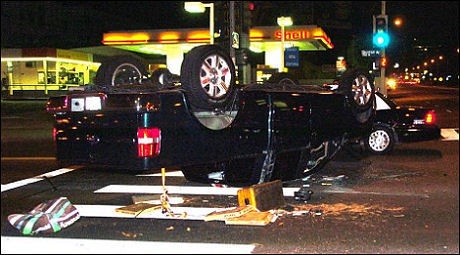I need to be fair and pass along this AP Anthony McCartney report that says Shia Lebeouf wasn’t at fault in last weekend’s flip-over accident. The article quotes Sheriff spokesperson Steve Whitmore as saying it was the other guy’s fault — ran a red light, slammed into Bebeouf’s truck. Was the other guy bombed also?
Streisand Says
In a Barbara Streisand e-mail interview by Politico‘s Jeff Ressner, the aging actress-singer is asked if race will continue to be a factor in the presidential election. Streisand, who took three full weeks to respond to Ressner’s questions (one week to read them, one week to formulate rough-draft responses, one week to polish and finalize), says she “want[s] to believe that our country can see beyond race as a factor in voting for a Presidential candidate.
“But on some level,” she adds, “it would be naive to think that race will not be a factor. I do believe, however, that there is much less racism, sexism and homophobia among the younger generation and that we have come a very long way.”
Thank fortune, that observation seems to be true. I wonder, however, if the impact of non-racist under-25 voters may be counter-balanced by the under-25 donkey element in rural America (the intellectual kin of those two American Teen guys who don’t want to know from politics) who don’t plan to vote at all. If Obama loses, it’ll be time to once again paddle the backsides of the under-25s. I was hoping I’d never have to use the term “Generation of Shame” ever again. GenY had better watch its ass.
Don’t Do It
Word around the campfire is that Virginia Gov. Tim Kaine is very high on the list of Democratic vice-presidential hopefuls. I’ve read a bit about him and he seems like a bright fellow with his feet on the ground, but Kaine just ain’t rock ‘n’ roll on a mike. And he has the face of a second-tier ward politician. There’s a slight old-school puffiness in his face that suggests he’s into taking a nip every now and then. His voice feels anxious and a bit shrill — slightly hoarse, high-pitched. His delivery really and truly lacks that “musical” element.
Kaine reminds me of either an Irish street cop from old-time Boston or a frazzled high-school principal from Marblehead, Mass. or suburban Maryland or southern New Jersey. He looks “regional” and doesn’t have that special sense of uptown schwing that national-level candidates need to have these days. He doesn’t sound eloquent or commanding or even centered, really. His thin voice strains for effect.
Please, BHO…no offense but not this guy. Joe Biden, please. Biden would be very cool, in fact.
Jolt
Pretty good earthquake just now! (Two minutes ago.) Without checking the Richter scale readings from Pasadena, I would say it was a good 5.5, at least. Do I hear six? Re-Re-Update: MSNBC just said it was a 5.4, centered in Chino. Two books fell off my bookcase and that’s all. No paintings or framed photos on the floor. Nothing to squawk about. I kind of enjoyed it on a certain level. Better than Sensurround. Chuck Heston, you are missed.
Venice Lineup
If I could afford to go to the Venice Film Festival a few days before attending the Toronto Film Festival, I’d be looking forward to ten or eleven of the films that were announced earlier today. Not that I know anything, but the names of Demme, Bigelow, Arriaga, Coen, Aronofsky, Schroeder, Schroter, Kitano and Miyazaki offer feelings of comfort and continuity. It’s also good to know most of these films will be playing in Toronto a few days later.

I’m frankly scared of Darren Aronofsky‘s The Wrestler because (a) wrestling has been a coarse, low-rent joke for decades, and (b) the wrestler is played by Mickey Rourke. But I shouldn’t admit to that prejudice. I just need to grim up and see it and go from there.
We all know the ups, downs and inside-outs of Joel and Ethan Coen‘s Burn After Reading. I’ve written about it so much I feel as if I’ve almost seen it.
Guillermo Arriaga‘s The Burning Plain…of course, of course. Charlize Theron, Kim Basinger, Jennifer Lawrence, Jose Maria Yazpik, Joaquim de Almeida.
Kathryn Bigelow‘s Hurt Locker — Iraqi bullets and IEDs, insurgents, and another go-round with a squad of hyperventilating, morally compromised U.S. soldiers with sweaty faces and coarse personalities. Remember that terrific one-sheet?
Jonathan Demme‘s Rachel Getting Married with Anne Hathaway, Debra Winger, Rosemarie DeWitt, Mather Zickel, Bill Irwin, Anna Deavere Smith, Anisa George.
Plus Takeshi Kitano‘s Achilles and the Tortoise, Hayao Miyazaki‘s Ponyo on Cliff by the Sea, Asmir Naderi‘s Vegas: Based on a True Story, Barbet Schroder’s Inju (shot in Japan), Werner Schroeter‘s Night of the Dog (Nuit de chien), Claire Denis‘s 35 Rhums, a short by Manoel de Oliveira called Do Visivel ao Invisivel, and a new version of Pier Palo Pasolini‘s La rabbia (’63).
Am I overlooking something exceptional that somebody actually knows something about?
Fallen
I’ve never thought of Jon Voight as intellectually challenged, but it’s hard not to at least consider the possibility after reading his 7.28 Washington Times op-ed piece slamming Barack Obama. “The Democratic party, in its quest for power, has managed a propaganda campaign with subliminal messages, creating a God-like figure in a man who falls short in every way,” Voight wrote. “It seems to me that if Mr. Obama wins the presidential election, then Messrs. Farrakhan, Wright, Ayers and Pfleger will gain power for their need to demoralize this country and help create a socialist America.”

I finally get what Angelina Jolie has been on about all these years. (I think.) Most people reading the Voight piece will say, “Okay, the Times gave him the rope and he hung himself.” But you’d think an arch conservative working in an overwhelmingly liberal town would think about restraining himself for expediency’s sake, if nothing else.
My honest deep-down reaction is that I now have a reason to feel negatively about the guy. I’m not saying Voight is on the HE shit list (although the idea certainly feels good — just as it felt good to imagine the same thing last spring about Tina Fey when she became a rabid Hillary person on SNL), and I certainly don’t think a symbolic condemnation along these lines would matter much to anyone. Nonetheless, it’s going to be hard henceforth not to think of Voight as some kind of diseased wingnut.
I’ll always admire and respect Voight’s better performances (Luke in Coming Home, Reynolds in Enemy of the State, Ed in Deliverance, Howard Cosell in Ali, Manny in Runaway Train, FDR in Pearl Harbor, Jack in Desert Bloom, Paul Serone in Anaconda). And he’s obviously entitled to say and write whatever he wants. But it’s only natural that industry-based Obama supporters will henceforth regard him askance. Honestly? If I were a producer and I had to make a casting decision about hiring Voight or some older actor who hadn’t pissed me off with an idiotic Washington Times op-ed piece, I might very well say to myself, “Voight? Let him eat cake.”
Duke-Outs for the Ages
Slate‘s Dennis Lim has put together an excellent video slide show on the evolution of Hollywood fight scenes. He explores how we got to the current vogue for jumpy, heavily-edited scenes, with stops along the way to look at The Big Country, Raging Bull, Natural Born Killers, The Matrix, The Bourne Ultimatum, etc.
My two favorites among Lim’s selections are the final Jake vs. Sugar Ray fight from Raging Bull, and the Big Country fist fight between Charlton Heston and Gregory Peck.
Old-fashioned as this may sound, I like my duke-out scenes cut so I can (gasp!) understand what’s going on. I’ve always loved the Bruce Willis vs. Alexander Gudonov tussle in Die Hard and yet I was totally fine with The Bourne Ultimatum. Where’s the fight scene from The Yards, which is one of the best ever by any standard?
Wisdom In This
Not the least bit believable as conversation, and way too glib and oppressively speechy (even by Paddy Chayefsky standards). But philosophically I swear by every word. They’re almost guaranteed to make any macho conservative sputter with contempt, but if we’d all be better off if we took the gospel of Charlie Madison more seriously.
Good To Hear
An HE reader named Sean M. wrote today to say “thanks for your pushing of Man on Wire. The wife and I went to go see it Sunday (and yes, we chose it over Stepbrothers) and it was the best moviegoing experience of the year, slightly nudging out The Dark Knight.
“Why? Because I am always riveted by movies that, despite the fact you know how it is going to end, create a level of tension that is only relieved by the completion of the act you were waiting for. Add to that removing the ‘taking for granted’ factor and really understanding the enormity of what this man willed himself to do…well it was a moving experience. It was one of those reminders of the power of cinema that I, and undoubtedly many others, do take for granted.”
That Aside…
Two issues with Stephen Saito‘s “The 10 Most Slanderous Slights” piece on ifc.com. One, it’s understandable why people might assume that Tom Cruise’s “Larry Grossman” character in Tropic Thunder is based on on Viacom chief Sumner Redstone, except he doesn’t look or sound like him. (I think Cruise is just playing a generic Hollywood bully-boy mogul.) And two, I was always told that Steve Martin‘s bearded producer character in Grand Canyon wasn’t based on action guy Joel Silver — I heard Larry Gordon.
Vietcong Basher?
In the Watchmen graphic novel, Dr. Manhattan (a.k.a. Dr. Jon Osterman) is a superhero in immaculate ice-blue skin — he’s a kind of nudist — who’s considered to be emotionless and uninterested in human affairs. He does nothing to prevent the murder of President John F. Kennedy, even though he’s aware it’s going to happen when he meets JFK. And he becomes a pawn of the United States government who helps our side win not only the Cold War but the godforsaken Vietnam War, of all things.

I need to re-read Watchmen or something. I know Alan Moore‘s story is about an alternate-reality universe in which things haven’t turned out like they did in actuality (i.e., victory over Russia, the triumph of Richard Nixon). But I have to say that Dr. Manhattan, no offense, kind of sounds on the surface like a sociopath. Or, you know, kind of a dickhead.
Billy Crudup, who likes playing conflicted, misunderstood guys, will portray Osterman/Dr. Manhattan in the forthcoming film. A superhero who helps defeat the Viet Cong? I know it’s not what it sounds like on the surface and there other myriad levels to consider, but nonethless there’s a voice in me that’s asking “what kind of horseshit is this?”

Grabber
I don’t mean to harp on Sunday morning’s Shia Lebeouf bang-up, but c’mon. It’s one thing to give or get a ding or a dent, but flipping your pickup truck at a major intersection (La Brea and Fountain) with pizza splattered all over the street and a major crater on the driver’s side door? That’s something out of the car-crash scene in Amorres perros.

I’ve been in two serious bangers — a BMW slammed into my right side in ’98, sending me spinning 270 degrees — but it takes a lot of speed and ferocity to flip a large pickup truck, lemme tell ya. Whoever did the initial reporting dropped the ball.

